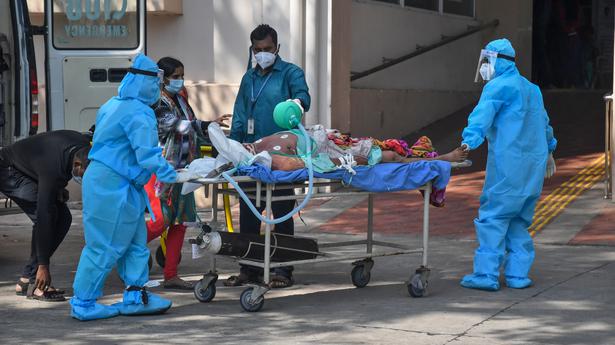
Every reinfection increases the risk to health
The Hindu
The study highlights the importance of preventing reinfection with SARS-CoV-2
A recent study has turned on its head the notion that getting naturally infected with SARS-CoV-2 virus would provide more protection from future infections. The study has found the complete opposite — a previous infection makes the next infection(s) worse. The study has been posted as a preprint in Research Square, which is yet to be peer-reviewed.
Compared with vaccination, first infection with SARS-CoV-2 virus is associated with increased risk of adverse health outcomes in pulmonary and extrapulmonary organ systems, hospitalisation and even death. And reinfection contributes to additional risk of deaths and adverse health outcomes in the pulmonary and several extrapulmonary organ systems, the study found.
“The risks were evident in those who were unvaccinated, had one shot, or two or more shots prior to the second infection; the risks were most pronounced in the acute phase, but persisted in the post-acute phase of reinfection, and most were still evident at six months after reinfection,” a three-member team led by Dr. Ziyad Al-Aly from the Washington University School of Medicine, U.S., says in the preprint.
The study was based on national health care databases of the United States Department of Veterans Affairs that included people with no infection (53,96,855), with one infection (2,57,427), and two or more reinfections (38,926). Among those with reinfection, 36,417 (12.29%) people had two infections, 2,263 (0.76%) people had three infections, and 246 (0.08%) people had four or more infections.
The study found that compared with those with first infection, people with reinfection had an elevated risk (hazard ratio or HR 2.14) of all-cause mortality. There was also increased risk of hospitalisation (HR 2.98) and at least one sequela of SARS-CoV-2 infection (HR 1.82) among people with a reinfection.
Compared to those with first infection, those with reinfection exhibited increased risk of sequelae — cardiovascular disorders (HR 2.36), hematologic disorders (HR 2.22), fatigue (HR 2.4), gastrointestinal disorders (HR 1.69), kidney disorders (HR 1.70), diabetes (HR 1.62), musculoskeletal disorders (HR 1.29), and neurologic disorders (HR 1.39).
“The risks were most pronounced in the acute phase, but persisted in the post-acute phase of reinfection, and risks for most sequelae were still evident at six months,” they write. “Compared to non-infected controls, assessment of the cumulative risks of repeated infection showed that the risk and burden of all-cause mortality and the prespecified health outcomes increased in a graded fashion according to the number of infections.”

Podcasts have become our best friends, especially during the Covid-19 pandemic. Whether you are cooking, sketching or going on an evening walk, there is a show that matches your mood. From horror tales to informative conversations to just two friends talking about anything & everything relatable, podcasts have become a part of our lives unknowingly. Over the years, more voices have joined this audio landscape and filled it with stories that resonate with our lives. Podcasts serve as a reminder that everyone has a story worth telling and listening to!










